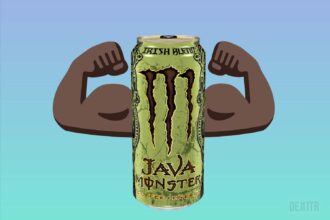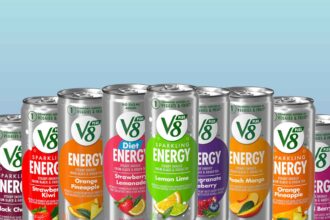If you follow trends related to energy drinks, you probably know they are banned in certain countries.
But why is it so? And what are the countries that have banned energy drinks? Well, that’s what we’ll be discussing in this post. So keep reading till the end!
Which Countries Banned The Top Energy Drinks?
Here’s a chart that shows the list of countries that have banned energy drinks:
| Countries That Banned: | Notes: |
| France | Ban Lifted In 2008 |
| Norway | Ban lifted |
| Denmark | Banned until 2009 |
| Chechnya | Banned Red Bull and other similar energy drinks |
| Lithuania | Banned the sale of energy drinks to minors (in 2014) |
| Latvia | Banned the sale of energy drinks to minors (in 2016) |
| Mexico | Mexican Senate banned energy drink sales, mixed with alcoholic beverages. |
Now let’s see why these countries have imposed bans related to energy drinks.
Why Are Energy Drinks Banned In These Listed Countries?
France, Norway, & Denmark
European countries like France, Norway, and Denmark were among the first to impose bans on energy drinks.
The French Government had banned Red Bull, and the primary reason was the associated health concerns.
The health authorities of France were concerned about unknown results of Taurine – an active ingredient in Red Bull and several other energy drinks. Moreover, this synthetic ingredient is also forbidden in different countries.
Red Bull was generally mixed with alcohol and consumed in the clubs. And the trend commonly occurred among young adults and youths.
Mixing alcohol and Energy drinks can be harmful. On the one hand, alcohol is primarily a depressant – it can slow down your body. On the other hand, as you may know, energy drinks have caffeine, resulting in a stimulating effect.
When both alcohol and caffeine are mixed, the caffeine acts as a masking agent for the depressant effect of alcohol.
What’s the result? The drinker will start feeling more alert than he or she would otherwise. So the drinker would tend to drink more alcohol, and the risk of alcohol-attributable harm further increases.
Moreover, health experts in France thought that Red Bull could lead to high blood pressure problems, which is not good for any individual.
There were also concerns about the high caffeine levels in Red Bull that were associated with miscarriages in pregnant women.
In addition, a healthy basketball player died in 2000 just hours after consuming Red Bull.
These concerns led France to impose a ban on Red Bull. And not just France but Norway and Denmark also joined the list of countries banning Red Bull. The ban was imposed for similar health-related concerns regarding Red Bull and its ingredients.
However, later on, France lifted the 12-year ban on Energy Drink Red Bull due to a lack of proof that it is harmful. The ban was lifted in 2008 after European Union regulations highlighted that a product couldn’t be banned unless enough evidence related to its health risk is available.
But since the government remained suspicious about the product, they kept it under their surveillance.
Before we move on to the next country, we think you may also like to read our guide on cheap Red Bull alternatives. (You can check it out after you’re done reading this article! 😉)
Chechnya
The Chechen government also declared a ban on the sale of Red Bull and similar energy drinks.
The government spokesperson gave the reasoning that it is actually intoxicating in an un-Islamic way. (Chechnya, officially the Chechen Republic, is the Republic of Russia, and today, a large portion of Chechens are Muslims.)
Lithuania & Latvia
In 2014, in Lithuania, and in 2016, Latvia imposed a ban on the sale of energy drinks to minors. They also limited the scope of marketing the said products.
Lithuania became the first Baltic State to impose a ban on energy drinks for individuals under 18. The ban implements a law that was made previously following a campaign regarding the adverse health impact of such products on children.
Moreover, the Lithuanian Law restricts the marketing and promotion of energy drinks in terms of ‘support’ or ‘enhancement’ drinks.
Latvia also imposed a ban on energy drinks (for those under 18) that had caffeine or stimulants such as Taurine or guarana.
The law they adopted aimed to protect children from the harmful effects of such drinks. Under this law, the cashiers are also supposed to ask for ID from the younger customers. If the cashier breaks the law, they can risk fines of up to $195.
Mexico
In October 2011, the Mexican Senate imposed a ban on the sale of energy drinks mixed with alcoholic beverages by all restaurants and bars. The Senate also voted for the prohibition on the sale of energy drinks for those under 18.
Are Energy Drinks Safe To Consume?
Although they are marketed as energy-boosting substances, some health professionals have cautioned about their harmful consequences.
The higher caffeine content in energy drinks can raise the risk of heart issues if overly consumed.
Different studies have shown that consuming energy drinks may raise blood pressure and heart rate.
Moreover, in most cases, energy drinks have a sizable amount of sugar. For instance, see this table:
| Energy Drink: | Quantity: | Sugar: |
| Red Bull | 8.4 ounce can | 27 g (nearly 7 teaspoons) |
| Monster | 16 ounce can | 54 g (nearly 14 teaspoons) |
Consumption of this much sugar can raise the blood sugar level. So if you have diabetes or have difficulty controlling your blood sugar level, be cautious with the consumption of energy drinks.
Some healthy alternatives to energy drinks include exercise, eating a piece of dark chocolate, or taking protein and carbohydrate-based snacks.
We also recommend you look at our DIY Natural Energy Drink Guide.
Final Thoughts
In short, France, Norway, Denmark, Chechnya, Lithuania, Latvia, & Mexico are the countries that banned energy drinks. Although bans are now lifted in some of these countries, it’s wise not to overconsume energy drinks.
Their short-term and long-term effects outweigh their advantages. Also, they are associated with health issues like high blood pressure, obesity, and cardiovascular problems.
If you are a healthy adult with no history of heart disease, consuming it occasionally in reasonable quantities is unlikely to cause heart issues.
In this fast-paced competitive world, sometimes we need that boost of energy, so many people consume energy drinks for that edge. But not much beats good rest, a healthy lifestyle, and a healthy diet.












